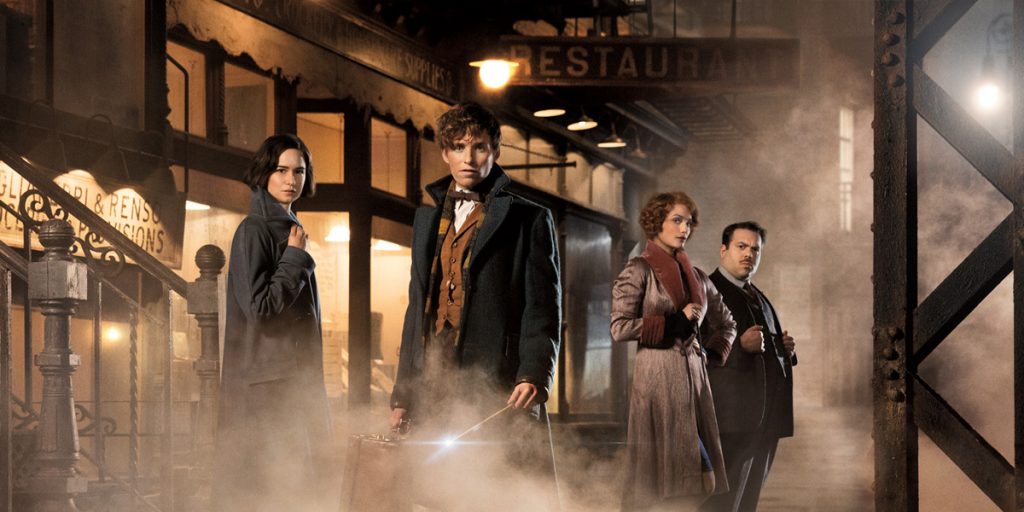With a new installment of Fantastic Beasts underway, we revisit the first two films in the series and see why these movies lack that special Harry Potter magic.
Harry Potter is one of those rare cases in film history where a franchise was made at the right time and place, with the right cast and crew. A true “lightning in a bottle” moment that allowed a whole generation to escape to an entirely different world that spoke to them on an emotional and imaginative level. Of course, these movies wouldn’t have been feasible if it weren’t for author J.K. Rowling, who created this immersive universe full of wonder and charming characters through her books. Rowling’s public image isn’t in an ideal place right now following her recent comments regarding transgender women, but it’s worth noting her work encouraged numerous children around the world to read and to one day become writers themselves with the stoy she created. With such an influential book series, it was only natural Hollywood would want to adapt those novels for the big screen, sparking a massive commercial and critical success. With how popular prequels are today, for better or worse, it was just a matter of time until WB dwelled into making films set before the events of Harry Potter, resulting in two of the messiest modern blockbusters we’ve seen in recent memory. So, before we dive deep into Fantastic Beasts, I think we need to identify what we mean with “Harry Potter magic” first and foremost.
This article contains spoilers for Fantastic and Where to Find Them and Fantastic Beasts: The Crimes of Grindelwald.
THE “HARRY POTTER” MAGIC
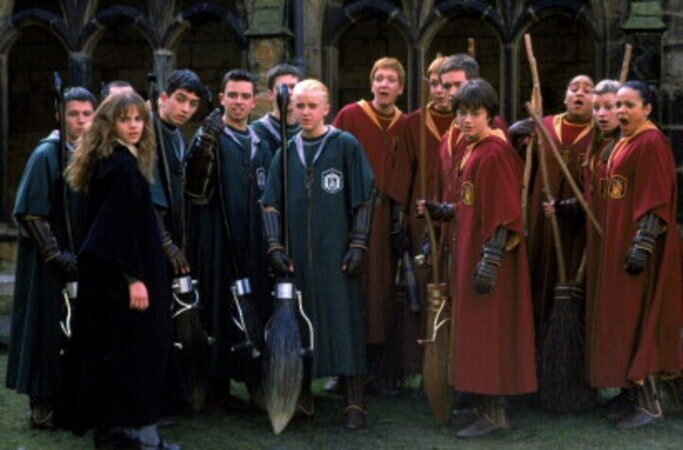
The core eight films follow the story of the boy who lived, aka Harry Potter (Daniel Radcliffe, The Lost City), as he’s seen going through a coming-of-age journey where he struggles to fight Lord Voldemort (Ralph Fiennes, The King’s Man), a dark wizard seeking immortality and to rule both the wizarding and Muggle (human) world. One of the many elements that made these movies so magical back in the day is that we got to see these characters grow up in real time, just like we’ve been doing with the kids from Netflix’s Stranger Things. Not only did keeping the same cast for all eight films allowed the movie adaptations to remain faithful to the source material, or at least as close as possible, but it let the audience get emotionally attached to these colorful characters as if they were part of their families.
Hermione (Emma Watson, Little Women), Ron (Rupert Grint, Servant), and, of course, Harry are written in a way that anyone, no matter their background, can relate to. Not to mention the electric chemistry our three leads shared with one another, giving you an authentic feeling of friendship that reminds you of those friends you made during childhood. Once the series came to an end in 2011, it left its mark in the industry as one of the most important film franchises of all time. It influenced a whole new wave of blockbusters based on books that would be split into multiple films. The Hunger Games: Mockingjay Part 1 & 2 and The Twilight Saga: Breaking Dawn Part 1 &2 are examples of this trend. Today, when you think of magic in the world of film, the first thing that will most likely come to mind is Harry Potter. An incredible legacy that makes it only more frustrating when you think about the franchise’s prequels: Fantastic Beasts.
FANTASTIC BEASTS AND WHERE TO FIND THEM: A CONFUSED NEW BEGINNING
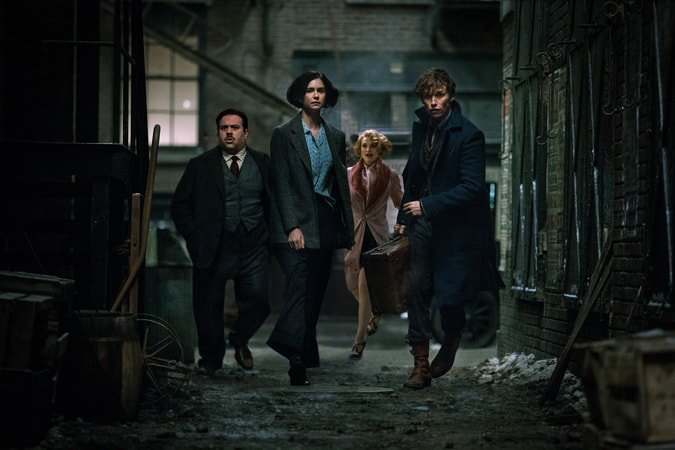
Fantastic Beasts and Where to Find Them takes place in 1926 New York, set 70 years before Harry’s adventures, and follows writer and magizoologist Newt Scamander (Eddie Redmayne, The Trial of the Chicago 7) as he stops in the city after his global excursion to find and document a variety of different magical creatures. Things get out of hand rather quickly, though, when Newt’s mysterious leather suitcase that contains his peculiar beasts goes missing, resulting in his creatures escaping into the No-Maj (American for Muggle) world. In addition, a threat looms in the background after Gellert Grindelward (Johnny Depp, Jeanne du Barry), a dangerous dark wizard seeking to dominate Muggles, is being hunted around the world, while an anti-witchcraft community called the New Salem Philanthropic Society (also known as the Second Salemers) tries to eradicate wizardkind.
I feel like from this synopsis alone you can spot the major issue with the movie: there is way too much going on at once. This isn’t to say it’s impossible to balance out these plotlines in a manner that makes sense and is meaningful, but unfortunately that isn’t the case here. Unironically, Fantastic Beasts’ shining moments are when the film actually focuses on the creatures themselves and the special bond that Newt has developed with them. It’s not very often that a huge blockbuster presents us with a protagonist whose main goal is to defend and care for animals in danger, rather than running around trying to be the courageous hero that stands against the villain, and this is a great message for younger audiences. Eddie Redmayne brings an odd charm to his character that could only exist in the Harry Potter universe, and for what is worth, Newt doesn’t come across as a carbon copy of characters that have come before him. If the film had strictly followed Newt, his human companion Jacob Kowalski (Dan Fogler, The Walking Dead), the American witch Tina Goldstein (Kathrine Waterson, Perry Mason) and her sister Queenie (Alison Sudol, The Last Full Measure) in their quest to recapture Newt’s creatures, then maybe Fantastic Beasts and Where to Find Them would have retained some of that same magic that made the previous movies stand out.
As the film reaches its midpoint, the filmmakers, for better or worse, seemed to be more interested in the Grindelwald subplot and the divide between Muggles and wizards over what had actually made the movie unique. This is the point where the film loses some of its momentum. These storylines in theory could have worked together. Just take a look at the Harry Potter series: those films have quite similar issues they need to resolve, yet you’re actually emotionally engaged because they make an attempt to establish a sense of urgency where the characters need to step up and do something about their obstacles. With Fantastic Beasts, on the other hand, we don’t spend enough time to care about the people in the Second Salemers or in the Magical Congress of the United States of America (MACUSA), who are the ones in charge of governing the wizarding community in the U.S. Tina and Queenie are the only ones within MACUSA who we are rooting for, as they’re seen as outcasts, but even then you’re more invested in their adventures with Newt than you are in the wizarding politics of New York. The film tries to bring all three plotlines together by the third act, but rather than building upon each other towards something meaningful, it just feels empty.
Credence (Ezra Miller, The Flash), adopted by the leader of the Second Salemers, has a tragic backstory, as the leader of the organization abused him and forced him to repress his magical powers, leading him to develop a dark parasite force known as obscurus. Miller does a good enough job to make you care about the character, but the script does little to no attempts at actually developing his storyline. So, by the time he becomes a big CGI monster that threatens the life of both Muggles and wizards, leading to his alleged death, you simply do not care.
Then you have Graves (Colin Farrell, The Batman), head of MACUSA’s department of magical security and law enforcement, who makes for an interesting antagonist whose intentions you don’t really understand until he’s revealed in the climax to be Grindelwald in disguise. This plot twist ends up taking away rather than adding any sort of emotional impact. The film keeps telling us that we should care about the danger he presents to the world because the characters themselves care, but that’s simply not how storytelling works. It feels lazy and unfocused, taking the spotlight away from the four characters we actually care about.In the end, Fantastic Beasts and Where to Find Them isn’t a complete disaster, but it isn’t great either.
The stuff that works here really does work. From the fantastic beasts, Newt and company, they’re the glue that keeps the movie together and helps it resemble any kind of magic that the franchise is best known for. If Harry Potter took us through a journey with a group of children growing into adulthood, then the first entry in this prequel series is about people who don’t really fit in coming together to form special human connections. Despite all the baggage it carries, somehow director David Yates manages to pull off an emotionally charged finale. With Grindelwald dealt with, for now, and the wizarding community working on a spell to make the No-Majs of New York forget about the obscurial that attacked the city, we are left with Newt, Tina and Queenie having to part ways as they’re forced by MACUSA to make Jacob forget about their adventures. The movie surprisingly comes back to life in its final minutes, treating us with a heartfelt farewell between these characters. Newt and Tina’s last scene in particular delivers an intimate, bittersweet moment that feels sincere and completes their journeys in a satisfying way. It’s unfortunate its sequel throws all of the film’s saving graces in favor of more of the same boring subplots that held this first installment back from greatness.
FANTASTIC BEASTS: THE CRIMES OF GRINDELWALD & WHAT WENT WRONG
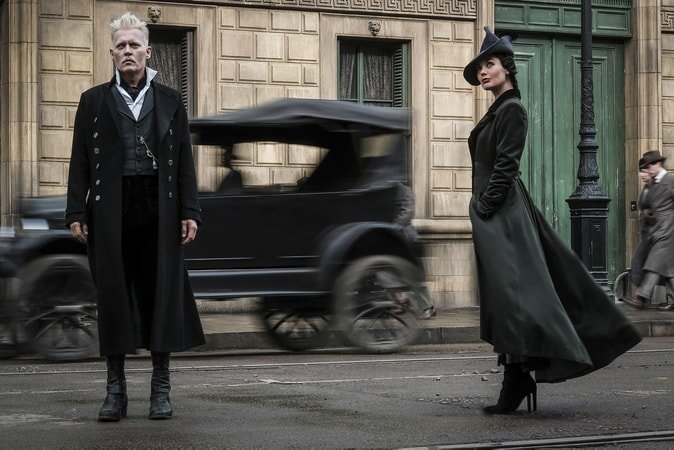
If I had praise for WB’s first attempt to spark new life into this already beloved franchise, don’t expect the same treatment for Fantastic Beasts: The Crimes of Grindelwald. Roughly a year later after the events in New York, MACUSA is seen transferring Gellert Grindelwald, played once again by Johnny Depp, from their maximum security prison to London so he can be tried for his crimes in Europe. Grindelwald escapes during the transfer and begins gathering followers for his cause, while desperately seeking out Credence, who seems to have survived and has a vital role to play in Grindelwald’s mischievous plan. Hogwarts’ headmaster, Professor Albus Dumbledore (Jude Law, Peter Pan & Wendy), is the only one capable of stopping him before it’s too late, but to do so he needs help from his former student Newt Scamander.
I usually try not to sound mean when talking about a piece of fiction that I don’t like, because I believe there’s good to be found in the bad, and vice versa, but I feel like I need to try to discuss as many details from this movie as possible just to demonstrate how nonsensical it is. Right off the bat, the film wastes no time in establishing how ridiculous its script is just in the first thirty minutes, opening with a relatively imaginative chase scene in the skies as Grindelwald rescues one of his followers who was disguised as him so Grindelwald could escape. It’s a visually appealing moment, but when you take a step back and realize how little sense it makes for the people in MACUSA to transfer Grindelwald from the U.S. to Europe using a flying carriage when they can literally teleport from one place to the next using magic, you quickly notice the principal problem with The Crimes of Grindelwald: things sort of just happen and characters make decisions not because it feels natural, but because the plot keeps demanding stuff needs to happen in order to get to the next big step in the story.
UNDEFINED CHARACTER MOTIVATIONS & DECISIONS
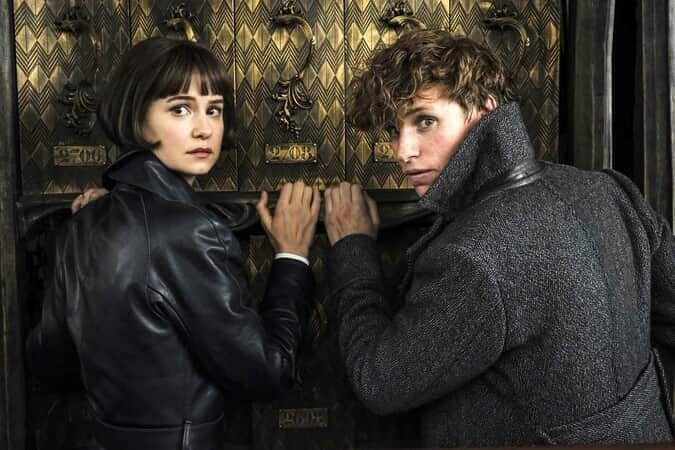
J.K. Rowling, screenwriter for both films, for some reason feels the need to make the returning characters unlikeable, dumber, and somehow more useless here. As much as I love Newt as a protagonist, he serves no purpose in this story whatsoever no matter how much Rowling tries to convince us otherwise. When we reconnect with him in the first act, he’s seen trying to appeal to the Ministry of Magic (government of the magical community of Great Britain and Ireland) to have his travel ban revoked after he was prohibited from doing so following his involvement in the incident in New York. His brother Theseus (Callum Turner, The Last Letter from Your Lover) and other important figures within the Ministry inform Newt that Credence survived and that he’s been spotted in Europe. How did he survive when he quite literally exploded? Rowling isn’t interested in acknowledging this and assumes the audience doesn’t care either, so it’s never explained. What does Newt have to do with any of this? Well, the Ministry wants him to join his brother’s ranks, become an auror (the wizarding world’s equivalent to police officers) and hunt down and kill Credence. Keep in mind Newt isn’t a strong fighter, the last film establishing he’s better at being a writer and magizoologist, barely surviving his encounter with Grindelwald. So, it doesn’t make sense to have Newt go after dark wizards. Again, the only reason why they want him to do so is because the plot demands Newt to be here.
Let us talk about the elephant in the room: Dumbledore. All things considered, Jude Law does a pretty damn perfect job at portraying the iconic character. He manages to retain some of the same wisdom both Richard Harris (Harry Potter and the Philosopher’s Stone) and Michael Gambon (Harry Potter and the Prisoner of Azkaban) brought to the role in past films, while bringing his own bit of nuance in terms of Dumbledore’s optimism and complicated relationship with Grindelwald. There’s honestly nothing wrong with how the character is portrayed. The problem is, for a film that’s much more interested in telling his story, he’s given so little to do to the point that he’s barely in the film. The sole purpose he serves is to force Newt into doing his bidding, resulting in a lack of character motivations since our protagonist doesn’t care to take a side in this wizarding civil war. Which begs the question: why not make Dumbledore the film’s protagonist? If you want to involve Newt into the narrative so badly, then make him a supporting character instead. Rowling and Yates try so hard to make us care about the connection Dumbledore and Grindelwald had when they were younger, but they forgot to put in the work and actually show us why their relationship is important. Sure, we’re presented with a blood pact where they swore to never fight each other, Grindelwald having in his possession the phial symbolizing their oath to protect himself from Dumbledore, but it’s not enough for us to be invested. For a film called The Crimes of Grindelwald, there’s very little Grindelwald and even less Dumbledore, their relationship being an afterthought in favor of plot.
Because J.K. Rowling seems to be trying to prove she can make things worse, Queenie and Jacob appear out of nowhere to visit Newt in his home after his day at the Ministry. You’ll think having these two characters back would help The Crimes of Grindelwald capture some of the heart from the previous movie, but you’d be mistaken. Where they brought so much charisma and a sense of innocence in Where to Find Them, both being a highlight of that film, here they are obnoxious and act out of character. In fact, all returning characters act out of character.
On one hand you have Jacob, who adds nothing to the story other than the fact he was a fan favorite, so why not bring him back, even though he got his memory wiped. How does he get his memories back? The film does the bare minimum and decides the best explanation to this question should be Jacob not having any bad memories, hence remembering his best life experiences with Queenie, Tina and Newt. Does it make sense? Absolutely not, but at least it isn’t as bad as what Rowling does with Queenie’s characterization. If she was a kind, loving, and understanding person in the first installment, here she is irrational, manipulative, and down right annoying. She goes so far as to put a spell on Jacob so he would agree to marry her against his will, something that goes against both of their characters because the Queenie we knew would never do this and if Jacob was given the chance to marry her he would do it without question.
Unfortunately, Tina isn’t safe from having her character messed with. After seeing a magazine mistakenly publishing a story saying Newt is engaged to Leta Lestrange (Zoe Kravitz, The Batman), whom he had a close relationship with when they were younger, she apparently gets upset and tries to forget about the relationship she had with Newt, despite Leta actually being engaged to Theseus. Not only does this seem weirdly childish for a character as smart as Tina, but its purpose to build tension between her and Newt just seems pointless when that tension was already established at the end of the previous movie. And because everyone seems to know about Credence’s survival and whereabouts except for the audience, we learn Tina is in Paris trying to find him before somebody else does. She meets a mysterious wizard named Yusuf Kama (William Nadylam, Stillwater), who seems interested in Credence as well. He kidnaps her and later captures Newt and Jacob after they learn he met Tina earlier. You’d think this would lead to something exciting, but it doesn’t. They escape rather quickly and it ends up being a misdirect that only wastes valuable screen time that could have been used somewhere else.
AN ATROCIOUS THIRD ACT
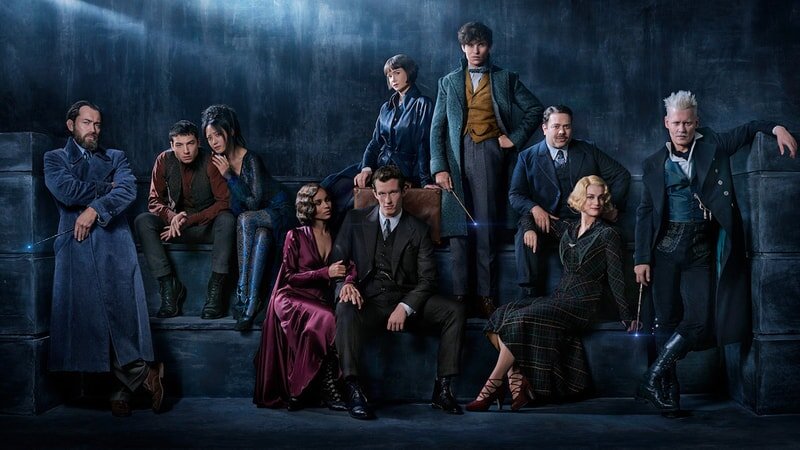
There are so many mind boggling decisions made in this movie, too many for our own liking, but because we don’t have all day to discuss every tiny little detail, and I think you now have an idea of how the film treats its characters, let’s jump straight into the climax where everything that’s wrong about Rowling’s writing can be found. After every single character goes on their own mission to discover an important piece of information, they all coincidentally teleport straight to where the plot is happening in some old crypts. In what is one of the most insane sequences in the film, which is saying a lot at this point, we are told why Kama is looking for Credence. He reveals Leta is his half-sister and he wants to take revenge on her father by murdering his youngest child, after he used magic to kidnap and rape Kama’s mother. This child being Credence, making him Leta’s lost brother, or at least that’s what Rowling wants you to believe.
In a confusing, yet unintentionally hilarious twist of events, Leta reveals she switched her baby brother for another baby (Credence) on their way to America in a ship, which later sinks and results in her real baby brother drowning. If this is confusing to comprehend, trust me you’re not alone. What does this achieve? Your guess is as good as mine. Kama doesn’t achieve his goal, Credence doesn’t learn his identity, and Leta only feels worse about herself after confessing. The only explanation I can think of is that this is Rowling’s way to misdirect the audience so the final twist regarding Credence is more shocking. And yes, all Newt does this entire time is stand in the background because the plot keeps telling him we need him. A common theme for him in the film.
As our characters try to process what they just learned, a door magically opens leading them to Grindelwald’s hideout where he is conducting a rally explaining to his followers his evil plan. What’s his plan you might ask? He wants to prevent the holocust and world war II from happening. How does he mean to do this? By doing exactly what Hitler did and attempt to eliminate an entire group of people he doesn’t like, in this case Muggles. I am oddly fascinated by J.K. Rowling’s thought process during the making of this. Clearly she wanted to say something meaningful about how wars come to be, but she ends up coming across as ignorant and down right offensive in the way she writes this conflict. The thing about a film like Captain America: Civil War is that both sides and their motivations are clearly defined and you sympathize with both Iron Man and Captain America, even if you disagree with their views on the conflict at hand. Here, by making Grindelwald’s goal be him wanting to stop World War II, you automatically make our heroes look like a bunch of douchebags for wanting to stop him. But also, the film contradicts itself by making Grindelwald the equivalent to wizard Hitler. It leaves us confused as to who we should be rooting for and not in the way Rowling probably intended.
The Crimes of Grindelwald comes to an end with a battle breaking loose in the crypts, resulting in Leta dying because I guess we have to raise the stakes, although there’s no real reason for her to die. Credence joins Grindelwald’s cause in search for answers regarding his heritage, breaking Nagini’s (Claudia Kim, The Dark Tower) heart in the process. Did I mention Nagini, Voldemort’s pet snake, is in this movie? Well, she is, and, like most characters in this movie, she has no purpose in the story. Queenie also agrees to help Grindelwald with his war against the Muggles, despite being in love with one, because she believes he has the best intentions for all wizards and witches. What’s funny about this character development is that we know Grindelwald’s intentions aren’t good and she could easily discover this by reading his mind since that’s one of her magical abilities, yet she doesn’t use it on him. It is such lazy writing where Rowling wants to create tension between characters, but she isn’t successful because she keeps prioritizing the plot rather than letting the characters drive the story. In the end, one of Newt’s creatures manages to steal the phial from Grindelwald and he takes it back to Dumbledore. In a last minute surprise, Credence is revealed to be Aurelius Dumbledore, long lost brother to Albus Dumbledore.
WHAT WILL BE THE LEGACY OF FANTASTIC BEASTS?
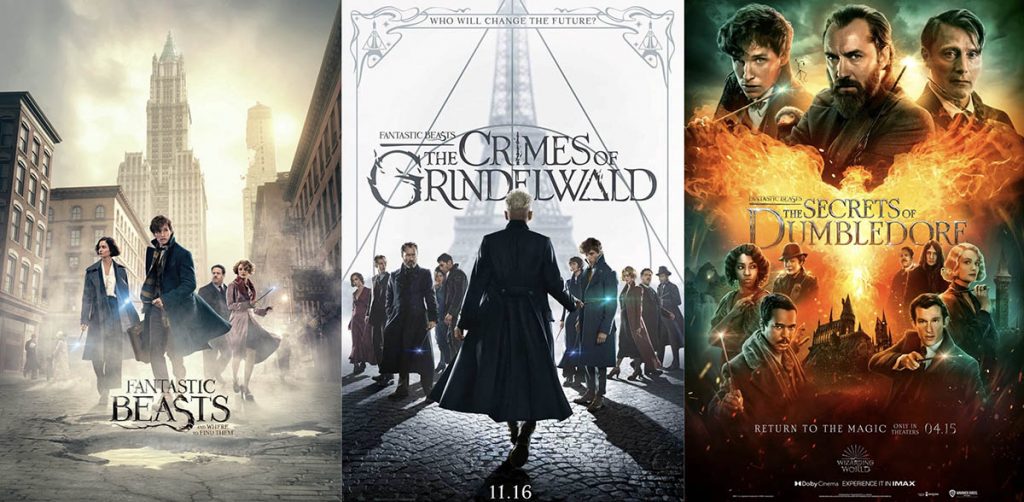
Let me take a step back and explain where the idea to analyze these movies originally came from. Trust me, it’s relevant to this discussion that is much broader and fascinating than simply calling a pair of movies “bad.” On January 1st, 2022, HBO Max released the documentary special Harry Potter 20th Anniversary: Return to Hogwarts. In it, we see original cast members from across all eight movies reunite in a film that celebrates the anniversary of The Philosopher’s Stone, including interviews and cast conversations. Within the first five minutes, Return to Hogwarts manages to have more magic and heart than either Fantastic Beasts movies. As a fan of “the making of” documentaries, this is a must-see for all cinephiles. It’s a touching and beautiful way to celebrate such a long lasting series that is destined to endure for an eternity. An amazing cast of actors and filmmakers looking back at a time where movies were made and approached differently than they are today, each film having a unique visual style and voice of their own because of the limitations of the time. Not only did this series shape and change the lives of the crew responsible to bring this world to life, but also the lives of those who got to watch the films on the big screen. Is an incredible achievement that might not be able to be replicated, not even by its own creator.
So, sitting down and watching this special unfold in front of my eyes, I was in disbelief at the rush of emotions I was feeling in the moment. This got me thinking, why couldn’t the same creative team behind Harry Potter replicate that same sense of wonder with Fantastic Beasts? Was I overreacting for not meeting my expectations, or were those movies actually as bad as I remembered them to be? Revisiting both Fantastic Beasts, something finally clicked with me. Whereas Harry Potter feels like a passion project from everyone involved, these new additions to the franchise feel very fabricated as if they were mandated by the studio so they could make a quick profit, rather than because somebody thought they would make a good story.
With Fantastic Beasts: The Secrets of Dumbledore upon us, it’s tough to get excited for a third installment in the franchise. Don’t get me wrong, I still think there’s some fun to be had with these films and the “so bad it’s good” vibe the series carries overtime, mainly with The Crimes of Grindelwald and its poorly written script. But even saying that is saddening to me. This incredibly talented set of actors and crew members deserve better after still bringing their A-game to a project that doesn’t have the best material. Needless to say, Fantastic Beasts losing that sense of wonder, awe and magic isn’t even the most surprising thing about any of this since it was obvious from the beginning the movies had no direction. No, the legacy of Fantastic Beasts will be the fact that seeing how an author can lose touch with her own work is more fascinating than the work itself. I am rooting for The Secrets of Dumbledore to prove me wrong, but after what we’ve seen I won’t get my hopes up.
Fantastic Beasts: The Secrets Of Dumbledore will be released theatrically in the UK, Ireland and Japan on April 8, and in the US and worldwide on April 15, 2022.

